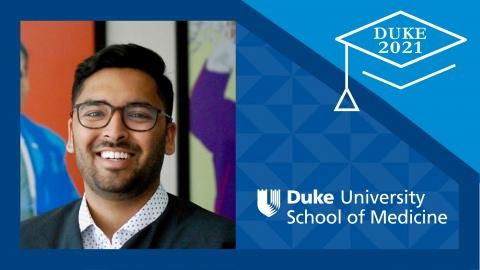
Name: Aikya Soni
Hometown: Chesapeake, VA
Degree: Master of Science in Population Health Sciences
Why did you choose a Master in Science Population Health Sciences?
It was a bit of a winding road to population health, but I became interested in social determinants of health during my medical sociology classes, learning that access to resources like transportation, water, shelter, green space, and good food is extremely important to one’s well-being. After graduating, I took a job at Duke Psychiatry in the Division of Child and Family Mental Health and used clinical data, like patient visits and provider volumes, to determine how to help providers meet clinical benchmarks and give patients in the community access to psychiatric services. So it was my schooling and first job that helped me realize I enjoyed the confluence of healthcare, healthcare delivery, and analytics.
I had intentions of going to medical school, but by chance happened upon the new Master of Science in Population Health Sciences and knew it was more in line with my passions. For example, I could study the U.S. health care system, how to address health disparities, and what we can learn about health care delivery from other countries.
What was your masters focus?
I wanted to combine my interests in digital health and technology to address health disparities and social supports. Because psychiatry is well-suited to these modalities, I continued working with the Department of Psychiatry & Behavioral Sciences during my first year of graduate school. Using skills I learned in statistics and programming courses, I analyzed clinical data from March to August during the pandemic and summarized the results of shifting nearly all of the psychiatry department visits to virtual care. Analytics also helped us determine how to best leverage resources at the department's disposal, like therapy and medication management, to deliver high quality health care in a virtual, more accessible fashion.
Can you describe your masters experience?
It’s been extremely positive, and being the first cohort, I liked that I could help guide and shape the program. Faculty and students both understood we were building something from the ground up, that we were all in it together, and we were there to help one another succeed.
On another note, the program seems to attract people from diverse backgrounds, cultures, and varied interests. It was fascinating to learn from everyone’s experience, whether from a physical therapy, mental health, pharmaceutical, or business perspective or how they delivered health care in Tanzania, Taiwan, and China vs. the U.S. Learning from my cohort and from population health’s multi-disciplinary faculty created a rich learning experience.
Where will you be working post-graduation and how do you hope to make an impact with your new degree?
During my summer internship and second year of school, I worked at SAS on the health policy consulting team and was offered a full-time job as a systems engineer. In the role, I will advise state and local government health care clients on leveraging SAS products and analytics services to provide more effective and efficient care to the people they serve.
What about your experience as a student during COVID-19 will you carry through to your career?
The pandemic made us more mindful of how we work together. I found it reassuring that DPHS faculty and staff always built in a few minutes at the beginning of each meeting to ask if people were doing well and taking care of themselves. I want to bring this practice to any job, regardless of my role. Many of us will continue to work remotely, so it’s upon us all to respect each other's lives and time, regardless of whether we're in a pandemic.
Read more about the Class of 2021 at medschool.duke.edu/graduation2021